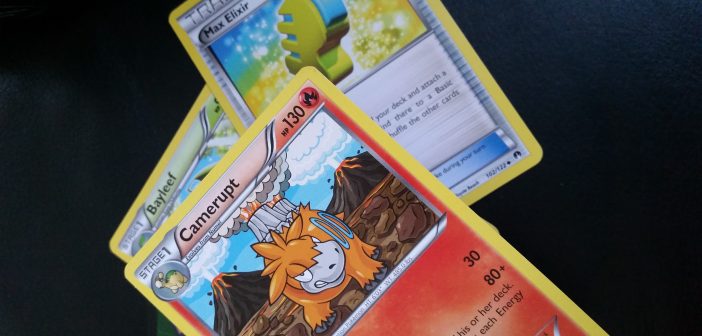I’m sitting at a suburban shopping centre this afternoon while my pre-teen children are playing in a social Pokemon round-robin competition. Yes you heard me right … POKEMON!
I thought Pokemon were just some cards with weird animated characters printed on them that primary school kids collect and swap BUT its a whole lot more than that and parts of it are pretty awesome. I thought it might be good to write a quick intro to the game for parents whose kids catch the bug.
Its a Game!
-Step-3.jpg/aid150030-728px-Build-an-Effective-Pokemon-Deck-(TCG)-Step-3.jpg) There are cartoons, movies and merchandise all over but at its core Pokemon is a card game. Its a strategic game too and there are serious players who compete for the right to attend the World Championships. Yep … there is a Pokemon world champ!
There are cartoons, movies and merchandise all over but at its core Pokemon is a card game. Its a strategic game too and there are serious players who compete for the right to attend the World Championships. Yep … there is a Pokemon world champ!
My best analogy is that Pokemon is a bit like chess but where each player can choose which pieces to have. There are hundreds of Pokemon cards and each one has a character printed on it with various abilities and attacks. Players build a deck of 60 cards that they challenge another player with, so each time you play you are competing against a different deck of cards. That makes the game different every time and so players collect, swap and trade cards to continually improve their deck of 60 cards.
How To Play
I won’t go into the finer points here but the basics are that you play against just 1 other person as you would in chess or checkers. A game usually takes about 15-30mins although beginners may take longer. Players take turns to draw a new card from their face down deck of cards and then they can do various things until finally they end their turn if they attack the opposition. Each attack does a certain amount of damage and once the total damage is greater than the Pokemon’s health … it dies.
Cards roughly are of 3 types … Pokemon (characters), energy (like power or fuel for attacks) and trainers which are just special non-combat characters that allow you to do things like find certain cards in your deck, or pickup extra cards or protect your Pokemon etc
As my boys became more familiar with the game they started to think through exactly which trainers will make it faster to power up their Pokemon and attack sooner etc … it gets very technical and there are stacks of websites dedicated to the theory and the best decks. You can play and enjoy it at a much lower level though from ages 5+.
The game ends usually when you claim 6 prize cards from your opponent … that usually means you have destroyed 4-5 of their Pokemon by attacking them.
Is it Expensive?
It certainly can be but its up to you and I’ll give you a few tricks to keep costs down. Firstly you need 60 cards to play with and you can buy starter decks for about $30 to get going. Obviously if you have 2 children you both  need a deck. Those starter decks are very basic and its possible to play but not that enjoyable. You can buy booster packs of 10 random cards for about $6 but a much cheaper way to get a good playable deck is to go to a game shop who sell 2nd hand cards for 5 or 10c … then you can grab what you want for a much lower price or add to your deck.
need a deck. Those starter decks are very basic and its possible to play but not that enjoyable. You can buy booster packs of 10 random cards for about $6 but a much cheaper way to get a good playable deck is to go to a game shop who sell 2nd hand cards for 5 or 10c … then you can grab what you want for a much lower price or add to your deck.
Its a bit hard to explain but Pokemon come in about 8 types and its best to try to focus on 1 or 2 of the types. They are called things like Life, Water, Fairy, Electric etc and they are different colours to make it easier to identify.
Its also possible to buy cards from local classifieds etc as many kids get into Pokemon and then move onto something else. Try ebay too for specific cards you might be chasing.
If you just want to play online for free to get the hang of it you can at Pokemon TCG and there are apps too for mobile devices.
Is it Good?
I think it is overall a very good game. Its not super expensive and its another strategy type game which stretches kid’s minds and teaches them to make value decisions as they build their decks. They have to manage their resources and constantly adapt their play to make the most of the cards they have.
It can be played simply for fun or it can be very complex and help players to use high end problem solving and cognitive skills. It does include some basic maths and probability so may assist with maths concepts too.
So don’t write Pokemon off as a simple trading card fad … its a serious game and one worth supporting if your kids are showing interest.

